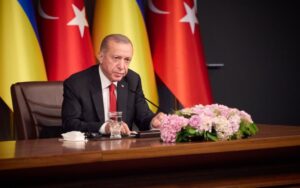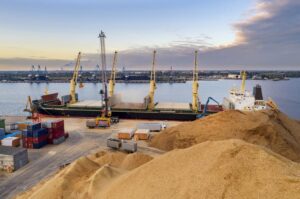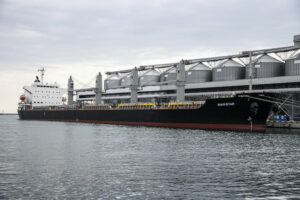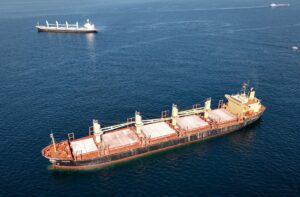
EU Diplomacy Chief Josep Borrell says the events in Ukraine threaten global food security, and the EU will discuss with the UN Secretary General the prospect of reviving the “grain deal”.
“This affects all countries, but especially the weakest and poorest. In August 2022, the UN played a crucial role in mitigating this suffering through the Black Sea Grain Initiative. However, in July, Russia decided to abandon this agreement,” Borrell wrote in his blog post, looking ahead to the UN General Assembly’s High Level Week that opens in New York.
“We will discuss with UN Secretary General Guterres ways and means to revive it. Sustainable development goals are in the focus of the UNGA,” said the EU High Representative for Foreign Affairs.

The Council of the International Maritime Organization (IMO) expressed deep disappointment with the termination of the Grain Initiative and reiterated its demands to Russia to immediately stop military aggression and threats to merchant shipping, the IMO said on Facebook.
During the 129th session in London, the International Maritime Organization welcomed Ukraine’s efforts to ensure freedom and safety of navigation in the northwestern Black Sea and pre-empt the global food crisis. The organization warned Russia against any actions that would threaten global food security, as well as the supply of food, medicines and basic necessities to Ukraine, it said.
The aggressor country was urged to adhere to international conventions and stop threatening merchant shipping in the Black Sea.
“Food for millions of people cannot be a weapon in the hands of an aggressor state against the whole world. Neither the world nor Ukraine should and will not depend on the desire of the Russian Federation to participate or not in the Grain Initiative,” said Deputy Prime Minister for Recovery – Minister of Community Development, Territories and Infrastructure Oleksandr Kubrakov, whose words are quoted in the report.
He assured that Ukraine with partners is looking for solutions to continue agro-export and resumption of merchant shipping, as he realizes its responsibility in ensuring food security of the world and international trade.
The Ministry recalled that by the decision of the Cabinet of Ministers a Fund of UAH 20 billion was created to provide guarantees of compensation if ships or cargo are damaged as a result of military aggression of the Russian Federation.
The International Maritime Organization (IMO) is a specialized UN agency that regulates international merchant shipping and is responsible for its safety. The organization has 175 member countries.
Source: https://www.imo.org/en/MediaCentre/Pages/WhatsNew-1936.aspx?fbclid=IwAR1-mpNU9XWByqEgPhyfpv7EDay6QTvZc_28lYJGXQ9z9LOYHVHqfE2Ax6A,

Turkish President Recep Erdogan said he would like to continue the work of the Black Sea Grain Initiative. He said this in Istanbul on Friday night to Saturday after talks with Ukrainian President Volodymyr Zelensky.
“In July 2022, we embodied the Black Sea Grain Initiative with our signatures in Istanbul as a result of the mediation efforts we had with the United Nations. On July 17, this initiative expires, during which about 33 million tons of grain were delivered to those in need in one year through the Turkish straits, which have become an artery for the whole world,” Erdoğan said.
“I wish this initiative to continue. I am convinced that all parties concerned will act with global responsibility for this purpose,” he said.
The Turkish president also noted that he would like the term of the grain corridor agreement to be extended to 2 years.

“Grain Initiative” is already operating at less than 20% of its normal throughput capacity because of the Russian Federation’s position in the joint coordination center and the situation is getting worse every day, Deputy Infrastructure Minister Yuriy Vaskov told Interfax-Ukraine in a commentary on Thursday.
“We have had only 43 vessels inspected for entry since May 1 until today. Accordingly, on average, since May 1, the Russian Federation has let in a little more than one vessel per day for inspection. Fifty-four vessels are currently awaiting inspection, some of which have been awaiting inspection for more than three months. The port of Pivdenny is not fully operational. If we talk in numbers, the initiative is already working at less than 20% of its normal capacity. And the situation is deteriorating day by day, solely because of Russia’s position in the joint coordinating center,” said Vaskov.
The deputy minister pointed out that the UN and Turkey are informed of the situation and negotiations are being conducted through them. “Negotiations are being conducted through the UN and Turkey. They are aware of the situation. Every day we communicate. At this time, we have no information that the situation can improve,” Vaskov said.
Answering the question about the prospects for Russian ammonia transit in exchange for guarantees of normal functioning of the secure grain export agreement, he recalled that the ammonia pipeline is currently non-operational. “The ammonia pipeline has been damaged twice in the last three days by Russian shelling. At the moment it is inoperable. To say how long it can be repaired, only the relevant specialists will be able to say when they get access and it is safe,” Vaskov said.
“The Black Sea Grain Initiative was adopted in Istanbul on July 22, 2022 with the participation of the UN, Ukraine, Turkey and Russia. Its essence is to create a corridor for the export of grain from the three Ukrainian ports “Chernomorsk”, “Odessa” and “Pivdenniy” in the conditions of Russia’s ongoing war against Ukraine. The initiative was concluded for 120 days and was extended twice, most recently on March 18. However, while Ukraine claimed it had been extended for 120 days, Russia claimed only 60, until May 18, and insisted on unblocking the operation of the Tolyatti-Odessa ammonia pipeline and lifting all sanctions on trade in Russian agricultural products and fertilizers.
On May 17, Turkey’s president said that the Grain Initiative would continue for two more months, which was later confirmed by UN Secretary General Antonio Gutteres. However, the head of the UN said that there were still unresolved issues.
The port of Pivdenniy is operated by the Odessa Port Plant, which is engaged in the transshipment of ammonia from the Tolyatti-Odessa ammonia pipeline.

Ankara wants the Black Sea Grain Initiative to continue functioning, Turkish Defense Minister Hulusi Akar said Thursday.
“Our wish is that the grain agreement be extended,” Anadolu Agency quoted the minister as saying.
For its part, the country’s Defense Ministry tweeted that the talks on extending the “grain initiative” were positive and constructive.
In turn, the Ministry of Infrastructure of Ukraine said at the end of the negotiations that the “grain initiative” should be extended for a longer period and expanded.
“This will give predictability and confidence to both the world and the Ukrainian market. But, above all, it is necessary to resume the registration of the incoming fleet and inspections without artificial delays and in accordance with the procedures of the Joint Coordination Center,” the agency said on its Facebook page.
Participants of the initiative agreed to continue negotiations at the technical level. They will be extended in the online format.
“Black Sea Grain Initiative” was concluded in Istanbul on July 22, 2022 with the participation of the UN, Ukraine, Turkey and Russia to create a corridor for the export of grain from three Ukrainian ports: “Chernomorsk”, “Odessa” and “Pivdenny”. The initiative was concluded for 120 days and was extended twice, most recently on March 18. However, while Ukraine claims that it was extended for 120 days, Russia claims that it was extended for only 60 days.
he Club of Experts previously analyzed the political and economic situation in Turkey on the eve of the presidential and parliamentary elections, see more at the link:

Ukraine is increasing the displacement of Grain Initiative ships in order to increase exports and reduce ship downtime in the current conditions of sabotage of ship inspections by the Russian side, the Ministry of Restoration reported.
“In particular, for grain – from 20,000 tonnes to 25,000 tonnes, and for oil – from 6,000 tonnes to 10,000 tonnes. Considering that the average number of inspections of the incoming fleet is only 2.5 ships per day, the increase should be expected in a month and a half,” the ministry said on Facebook on Monday.
It also indicated that the ports of Greater Odesa last week sent 1.1 million tonnes of agricultural products as part of the grain initiative.
“In particular, 54,000 tonnes of wheat were sent to Sri Lanka, 57,000 tonnes to Bangladesh, and 90,000 tonnes are expected in Kenya, Tunisia and Egypt,” the ministry said.
According to the ministry, exports via the grain corridor last week increased by 152,000 tonnes compared to the previous week, but the overall rate of new ships entering for loading continues to decline.
“Last week, the ports of Greater Odesa accepted only 16 ships, the day before last – 25,” the department added.
At the same time, as of February 12, some 145 vessels are already awaiting inspection by the Joint Coordination Centre (JCC), of which 122 are heading to Ukrainian ports for agricultural products.
For comparison, by January 18, 121 ships (28 with agricultural products on board, 93 ships that went to ports for loading) were waiting for the JCC inspection in the Bosphorus, 104 ships on January 13, some 98 on January 10, and 95 on December 26.
“For the third month in a row, Russians have been purposefully sabotaging inspections under various unfounded and sometimes absurd pretexts,” the ministry said.
There are 18 vessels in the ports of Greater Odesa. They load 584,500 tonnes of Ukrainian food. Only one vessel moves along the grain corridor after the inspection.
In total, since August 1, a total of 732 ships left the ports of Greater Odesa, which exported 21 million tonnes of Ukrainian food to the countries of Asia, Europe and Africa. According to the estimates of the Ministry of Restoration, this volume should have amounted to more than 35 million tonnes in the conditions of the normal functioning of the grain initiative.